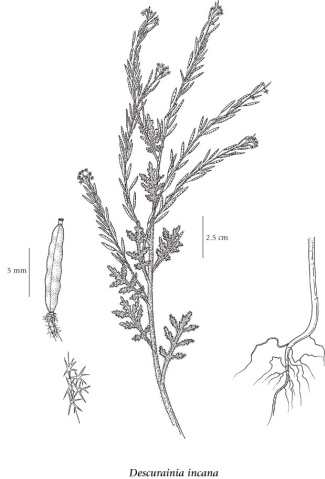Descurainia incana (Bernh. ex Fisch. & C.A. Mey.) Dorn
Richardson's tansy mustard (mountain tansymustard)
Brassicaceae (Mustard family)
Introduction to Vascular Plants
Richardson's tansy mustard (mountain tansymustard)
Brassicaceae (Mustard family)
Introduction to Vascular Plants
Species Information
General:
Annual or biennial herb from taproot; stems 20-100 cm tall, usually branched, at least above, nearly glabrous and greenish or the hairs whitish-starlike, often stalked-glandular above.
Leaves:
Basal and lower stem leaves once or twice pinnately lobed or 1-2 compound, widely lanceolate or oblanceolate to egg-shaped, 1.5-10 cm long; upper stem leaves simple to 1-pinnate, entire.
Flowers:
Racemes densely flowered; flower stalks slender, spreading to strongly ascending, 4-8 mm long; petals pale to deep yellow, 1.5-3.5 mm long; sepals 1-2.5 mm long.
Fruits:
Siliques, straight or somewhat curved, 5-17 mm long, 1-1.5 mm wide, usually longer than the stalks, strongly constricted between the seeds, tapered and sharp-pointed at each end but more at tip; styles 0.1-0.7 mm long; seeds in one row, usually 4-10 per chamber.
Notes:
Three subspecies may be recognized in BC.
1. Stalks and siliques erect and closely appressed to the axis of the inflorescence; plants with greyish, starlike hairs, infrequent in SE BC, rare northwards....................... ssp. incana
1. Stalks and siliques ascending to spreading; plants with or without glands, infrequent in SW and SC BC.
2. Plants with stalked glands, infrequent in SW and SC BC....................... ssp. viscosa (Rydb.) Kartesz & Gandhi
2. Plants without glands, infrequent in SC BC.................... ssp. incisa (Engelm.) Kartesz & Gandhi
Illustration

If more than one illustration is available for a species (e.g., separate illustrations were provided for two subspecies) then links to the separate images will be provided below. Note that individual subspecies or varietal illustrations are not always available.
Illustration Source: The Illustrated Flora of British Columbia
Ecology
Ecological Framework for Descurainia incana
The table below shows the species-specific information calculated from
original data (BEC database) provided by the BC Ministry of Forests and Range.
(Updated August, 2013)
The table below shows the species-specific information calculated from
original data (BEC database) provided by the BC Ministry of Forests and Range.
(Updated August, 2013)
| Site Information |
Value / Class |
||
|
Avg |
Min |
Max |
|
| Elevation
(metres) |
752 | 275 | 1830 |
| Slope
Gradient (%) |
33 | 0 | 78 |
|
Aspect (degrees) |
180 | 15 | 360 |
| Soil
Moisture Regime (SMR) [0 - very xeric; 4 - mesic; 8 - hydric] |
2 | 0 | 5 |
| Modal
Nutrient Regime
Class |
C | ||
| #
of field plots species was recorded in: |
75 | ||
| Modal
BEC Zone Class |
BG | ||
|
All BEC Zones (# of stations/zone) species was recorded in |
AT(3), BG(35), IDF(15), IMA(1), PP(15), SBS(1) | ||
|
Source:
Klinkenberg 2013
|
|||
